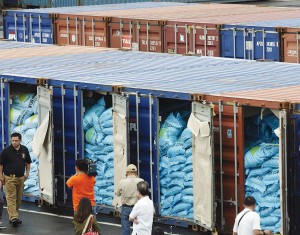BOC scores, takes over P450-M smuggled rice

Customs Commissioner Ruffy Biazon (left) inspects part of the 90 40-foot containers loaded with illegally imported rice from Vietnam worth P42.5 million at the Subic Bay Freeport about two weeks ago. Biazon said Bureau of Customs was about to confiscate a much bigger shipment of rice from India worth P500 million also at the Subic Freeport. FILE PHOTO/NIÑO JESUS ORBETA
SUBIC BAY FREEPORT—The Bureau of Customs (BOC) has made formal seizure of what it calls its “biggest smuggled rice haul”: Some 420,000 50-kilogram bags of Indian white rice that were abandoned in early April here.
Customs Commissioner Ruffy Biazon on Tuesday joined officials of Subic Bay Freeport (SBF) in inspecting the smuggled rice shipment, which has an estimated market value of P450 million.
As the BOC seized the shipment, lawyers of the consignee asked the bureau to lift its seizure and detention order.
Biazon said “there was clearly a grand design to illegally slip the 420,000 bags of imported white rice into the country as not only was the importation undocumented, but its consignee tried to make it appear it’s a transshipment load originally bound for Indonesia.”
“Without doubt, this is a large-scale attempt to smuggle rice into the country. Had we not stopped this illegal rice importation, it would cause tremendous damage to our local farmers,” he said.
Biazon said the BOC would “never allow unscrupulous traders to exploit the privileges offered by the country’s various free port zones like the Port of Subic to be their staging points for smuggling.”
He said Vinalines Mighty sailed into the port of Subic on April 4, carrying the shipment for its consignee, Metro Eastern Trading Corp.
Two warehouses
The shipment is kept in two warehouses here.
“They also said that the real consignee of the 420,000 bags of rice was an India-based company, Amira Foods International DMCC, and that the rice shipment was originally intended for Jakarta, Indonesia,” Biazon told reporters here.
He said lawyers of Metro Eastern had told the BOC that because of the delayed arrival of the vessel that carried the rice shipment from India to Indonesia, the shipment’s import permit for Jakarta had already lapsed.
“The Jakarta customs, then, did not allow the rice to be unloaded, prompting Amira to seek a port that allows transshipment, such as the port of Subic. That’s their claim,” Biazon said.
Absence of NFA permit
Despite this explanation, Biazon said the consignee failed to produce the required documents for rice importation, such as the allocation and import permits from the National Food Authority (NFA).
Danilo Lim, deputy customs commissioner for intelligence, said reports indicated that the vessel carrying the Indian rice had been seen cruising on Subic Bay for at least a month before it unloaded the shipment at the free port.
Lim said one of the issues that needed to be probed was how the rice shipment entered Subic.
“Why was the rice allowed to be brought to the warehouses in the first place without the necessary documents, just like it was not allowed to unload in Indonesia without the necessary permits?” Lim asked.
Asked how the shipment ended in Subic, Biazon said: “The first line of defense is the SBMA (Subic Bay Metropolitan Authority). This is their port.”
No turf war
Before the inspection of the two warehouses was done, SBMA and BOC officials held a joint press conference. “[This is to show that] there is no turf war, contrary some reports that came out in the media,” Biazon said.
SBMA Chairman Roberto Garcia said that despite this incident, “both SBMA and BOC are working together to [curb smuggling here].”
He said Metro Eastern was allowed time, according to SBMA rules, to produce the necessary documents.
But when it could not present the documents, “then we handed over the case to customs,” Garcia said.
Really for Subic
In a statement, Errol Albano, port collector at Subic, said contrary to claims made by Metro Eastern, the rice shipment was really intended for delivery to Subic, as shown by its bill of lading.
Albano said the packing list and commercial invoice issued on March 20 showed that Metro Eastern was the consignee and that Subic was the port of discharge.
Before the seizure of the Indian rice here, the BOC seized last week P42 million worth of smuggled rice from Vietnam. With a report from Jerry E. Esplanada in Manila














